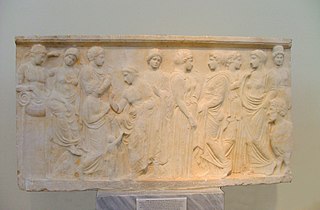Related Research Articles
In Greek mythology, Phegeus was the name of the following characters:
In Greek mythology, Dymas is the name attributed to the following individuals:

In Greek mythology, Argia or Argea was a daughter of King Adrastus of Argos, and of Amphithea, daughter of Pronax. She was married to Polynices, the exiled king of Thebes, and bore him three sons: Thersander, Adrastus, and Timeas.
In Greek mythology, Euneus was a son of Jason and Queen Hypsipyle of Lemnos; he had a twin brother whose name is variously given as Nebrophonus, Thoas or Deipylus.
Iphitos or Īphitus is the name of six individuals in Greek mythology.
In Greek mythology, Aergia is the personification of sloth, idleness, indolence and laziness. She is the translation of the Latin Socordia, or Ignavia: the name was translated into Greek because Hyginus mentioned her being based on a Greek source, and thus she can be considered as both a Greek and Roman goddess. Aergia's opposite character is Horme, a goddess of effort.
In Greek mythology, Hippasus or Hippasos is the name of fourteen characters.
In Greek mythology, the name Abas is attributed to several individuals:
There are several figures in Greek mythology named Manto, the most prominent being the daughter of Tiresias. The name Manto derives from Ancient Greek Mantis, "seer, prophet".
In Greek mythology, Menoeceus was the name of two Theban characters. They are related by genealogy, the first being the grandfather of the second.
In Greek mythology, the name Naubolus may refer to:
In Greek mythology, the name Ornytus may refer to:
In Greek mythology, the name Chromis may refer to:

In Greek mythology Cephissus also spelled Kephissos is a river god of ancient Greece, associated with the river Cephissus in Attica and/or with the river Cephissus in Boeotia, both in Greece.
In Greek mythology, Ismenis was a naiad nymph, one of the daughters of the Boeotian river god Ismenus: Ismenis is a patronymic rather than a given name.
In Greek mythology, Linus, son of Apollo and Psamathe, daughter of King Crotopus of Argos.
In Greek mythology, Aconteus may refer to the following distinct two individuals:

In Greek mythology, Manto was the daughter of the prophet Tiresias and mother of Mopsus. Tiresias was a Theban oracle who, according to tradition, was changed into a woman after striking a pair of copulating snakes with a rod, and was thereafter a priestess of Hera.
In Greek mythology, Iphinous, Iphínoos may refer to the following personages:
In Greek mythology, Echetlus was one of the defenders of Thebes. According to myth, he was sent by gods, as none knew him from Greeks. He vanished after having killed a large number of Persians with his light throw magical weapon.
References
- Publius Papinius Statius , The Thebaid translated by John Henry Mozley. Loeb Classical Library Volumes. Cambridge, MA, Harvard University Press; London, William Heinemann Ltd. 1928. Online version at the Topos Text Project.
- Publius Papinius Statius, The Thebaid. Vol I-II. John Henry Mozley. London: William Heinemann; New York: G.P. Putnam's Sons. 1928. Latin text available at the Perseus Digital Library.